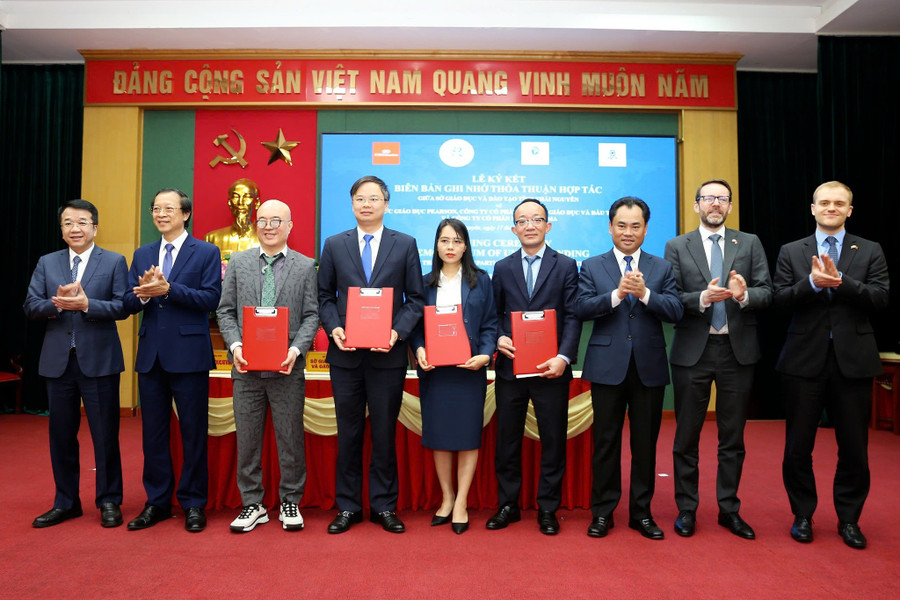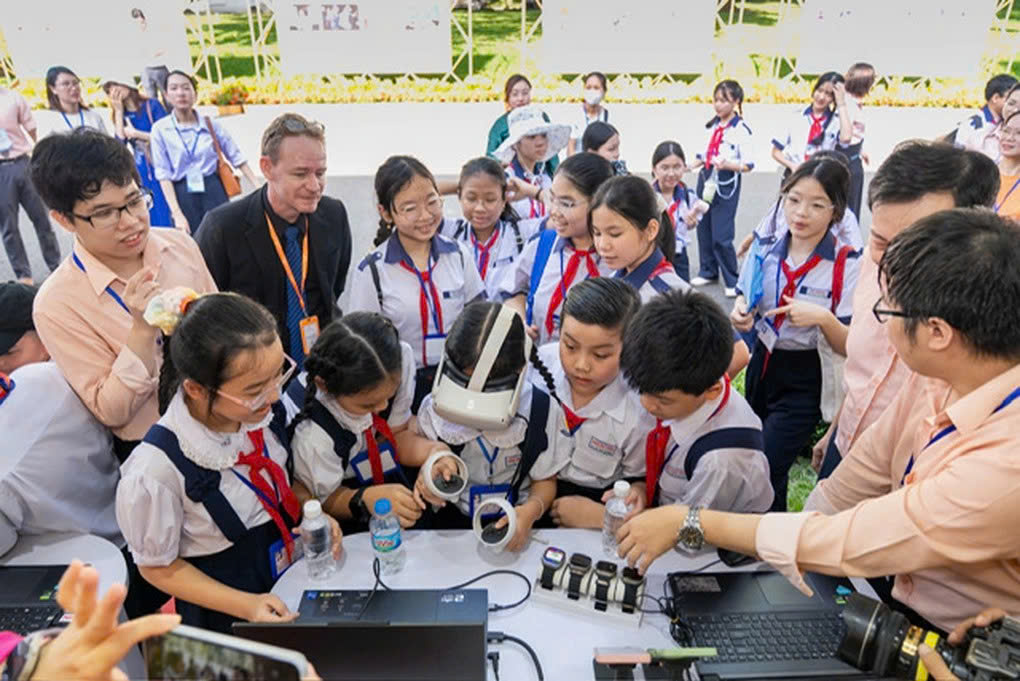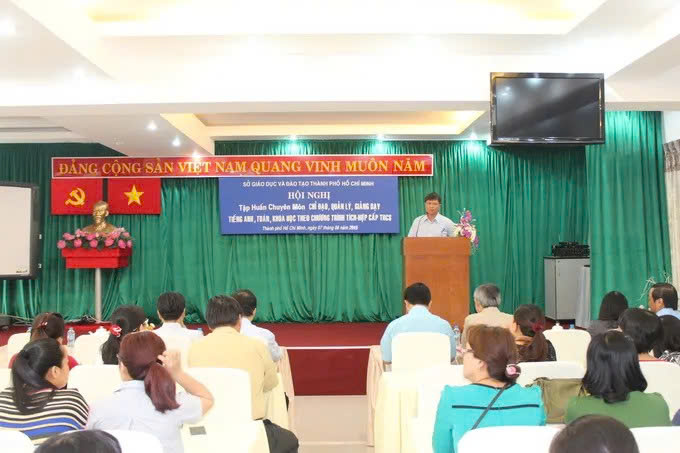On October 11, the Ho Chi Minh City Department of Education and Training, in collaboration with EMG Education Group, organized a seminar titled “Some Solutions to Make English the Second Language in Schools in Vietnam.”
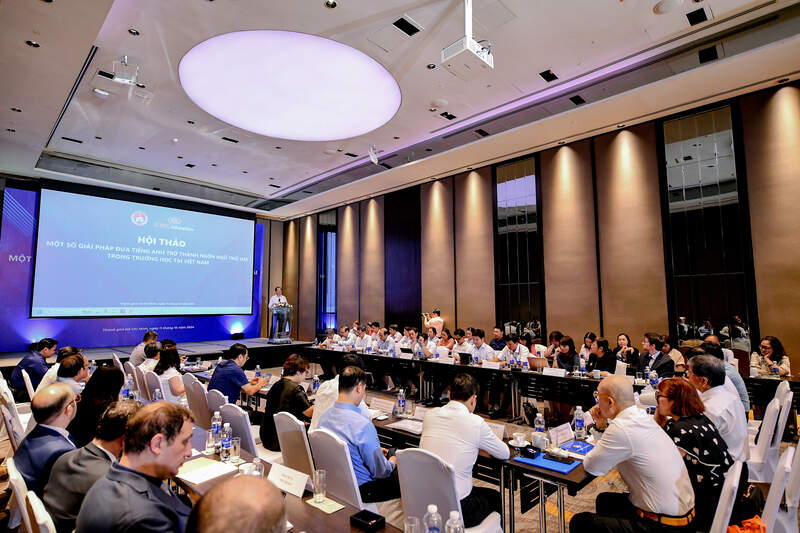
Overview of the seminar “Some Solutions to Make English the Second Language in Schools in Vietnam”
The seminar was attended by Deputy Minister of Education and Training Phạm Ngọc Thưởng, leaders of specialized departments and agencies under the ministry; Mr. Nguyễn Văn Hiếu, Director of Ho Chi Minh City Department of Education and Training; representatives from Saigon University, the head of the Education and Training Department of Thu Duc City, heads of Education and Training Departments from various districts, and principals from many primary, secondary, and high schools in Ho Chi Minh City.
Participation from all levels, sectors, educational institutions, businesses and support from parents is needed for success
The seminar was organized to propose solutions for implementing Conclusion No. 91 of the Politburo, which sets the goal of gradually making English the second language in schools.
Through the in-depth presentations at the seminar, all participants discussed and shared the current state of English teaching and learning, thereby proposing practical and effective comprehensive solution groups regarding policy mechanisms, teacher training, curriculum content renewal and assessment, as well as the coordination of various levels, sectors, and the whole society to gradually realize this strategic goal.
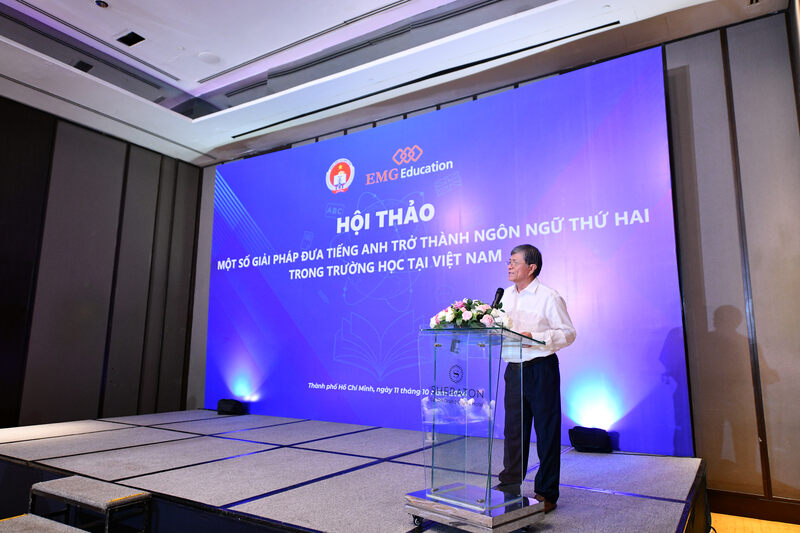
Mr. Nguyen Van Hieu - Director of Ho Chi Minh City Department of Education and Training - speaking at the seminar
In his opening remarks at the seminar, Mr. Nguyễn Văn Hiếu highlighted several key solution groups, such as creating an English learning and usage environment, innovating English teaching and learning methods, improving the quality of teaching staff, and enhancing international cooperation in the field of English education.
Mr. Nguyễn Văn Hiếu also emphasized: “To successfully implement the goal of making English the second language in schools in Vietnam, we need the collective efforts and unity of the entire political system, the active participation of various levels, sectors, educational institutions, scientists, experts, businesses, along with the support of parents and the whole society.”
Proposing 3 tiers for implementing curriculum frameworks
At the seminar, Mrs. Nguyễn Phương Lan, CEO of EMG Education, proposed a model for implementing teaching frameworks and assessment solutions based on a three-tier deployment approach.
These tiers are: Comprehensive implementation of English as a second language; standard-level implementation of English as a second language; and the lowest level, which is the gradual step-by-step implementation.
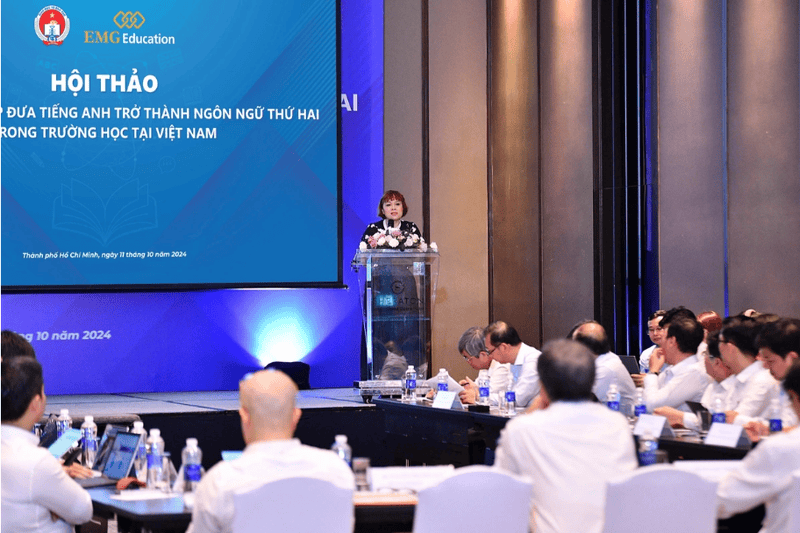
Ms. Nguyen Phuong Lan - General Director of EMG Education - presented at the seminar
According to many experts, over the years, Ho Chi Minh City has been implementing many breakthrough programs and projects such as the English Enhancement Program; the “Teaching and Learning Mathematics, Science, and English Integrated with the UK and Vietnam Curricula” under Project 5695; and the high-quality school model “Advanced Schools, International Integration” in Ho Chi Minh City according to Decision No. 07/QĐ-UBND.
With the positive results of Project 5695, many experts at the seminar affirmed that Ho Chi Minh City is fully capable of beginning to implement making English the second language in schools at the highest level (comprehensive implementation) of the proposed model in some schools.
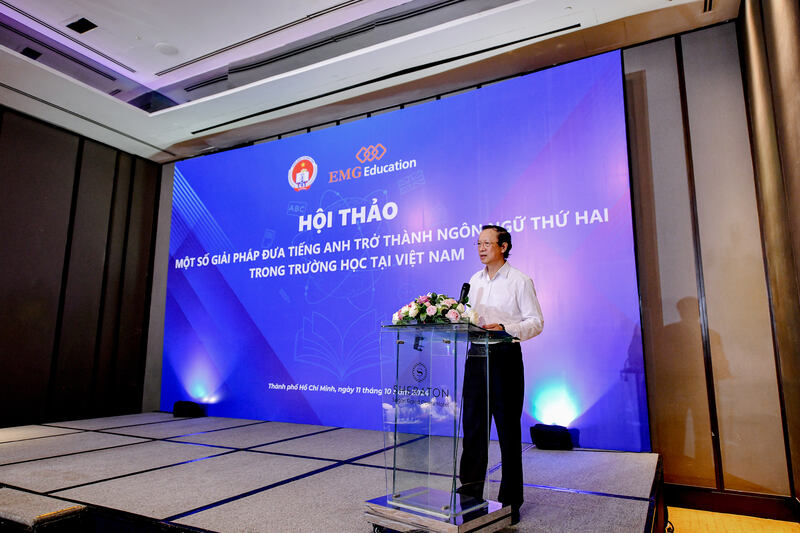
Deputy Minister of Education and Training Phạm Ngọc Thưởng speaks at the seminar
Speaking at the seminar, Deputy Minister of Education and Training Phạm Ngọc Thưởng proposed several solutions:
“The Ministry of Education and Training will advise the Government to soon issue a national project to make English the second language in schools, which will include solutions for resources, policy mechanisms, teacher training, and creating opportunities for native teachers to cooperate and work in Vietnam...
Thus, we need five main pillars: state management, scientists and experts, educational institutions, schools, and businesses to participate in contributing to this national project. In my opinion, by 2025 we can complete this project and clearly define the roadmap as well as the implementation solutions. The practical experience of Ho Chi Minh City in implementing Project 5695 shows that a specific strategy and plan are needed...
We need to implement synchronous solutions, including identifying immediate, long-term, and breakthrough solutions. This way, we can have a comprehensive approach, but we must identify the breakthrough solutions, not just apply the same methods everywhere. Encouraging localities with suitable conditions like Ho Chi Minh City to lead and guide the effective teaching and learning of English.”
Mr. Phạm Ngọc Thưởng also evaluated that this is the first large-scale seminar organized since the Politburo's Conclusion 91 on August 12.
This shows Ho Chi Minh City's determination to take the lead in making English the second language in schools.
Making English a second language in schools is an important, strategic goal Conclusion No. 91-KL/TW dated August 12 from the Politburo on continuing to implement Resolution No. 29-NQ/TW dated November 4 from the 11th Central Committee 'on fundamental and comprehensive innovation in education and training' has clearly directed the goal of making English the second language in schools in Vietnam. This is an important and strategic goal, contributing to the creation of high-quality human resources, meeting the country's development requirements in the integration period. |
4 key solutions to make English as a second language in schools From international experience, Mr. Nguyễn Văn Hiếu, Director of the Ho Chi Minh City Department of Education and Training, assessed that to make English the second language in schools, we need to focus on four main solutions:
|
Source: Mỹ Dung (Tuổi Trẻ Newspaper)






